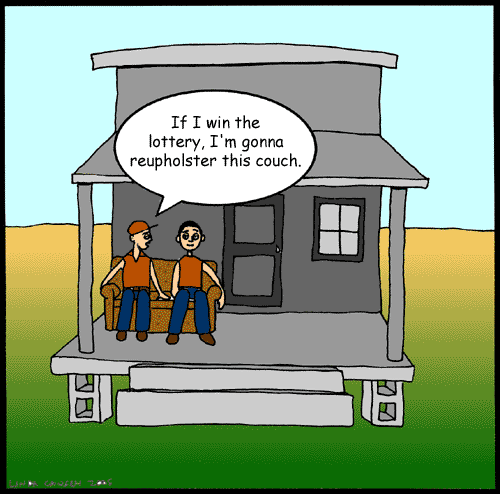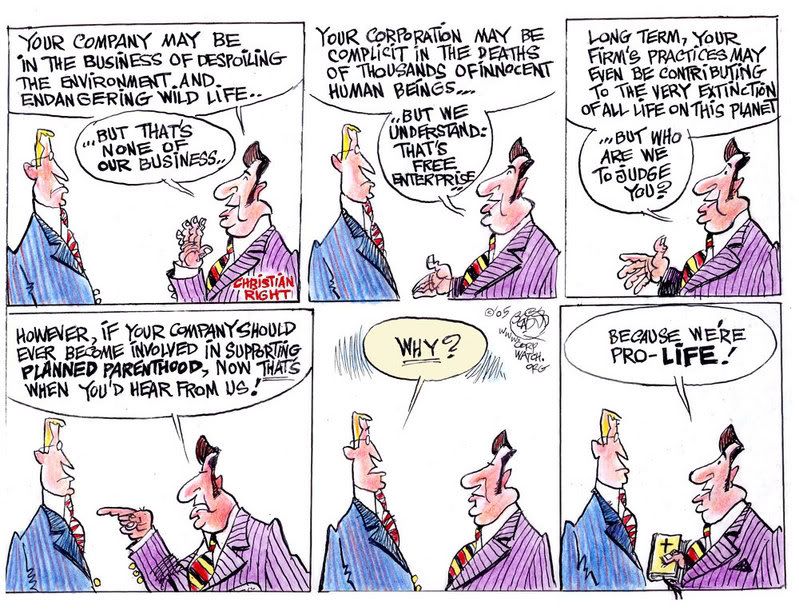
This is the epitome of regressive taxation - the lives of malnourished and starving children left in the hands of the 'have-nots' (that's who purchase the bulk of lottery tickets) and a get-rich-quick scheme. This is what conservative policies have brought the world to:
The United Nations is planning a global lottery to raise about $500 million a year to combat extreme hunger that threatens the lives of 146 million young children in the poorest nations of Africa, Asia and Latin America.
The UN's World Food Program wants to sell scratch-off lottery cards for 1 euro ($1.26), beginning in Europe within the next year. France and Spain have agreed to market the tickets, according to WFP Director Cecile Sportis. The cards would reveal a cash prize or a commitment to funding a UN program, such as meals for children.
The UN Children's Fund said in a report today that almost a quarter of children under age 5 in developing nations are undernourished, which stunts their growth and weakens their resistance to illness. The condition causes the deaths of 5.6 million children each year, Unicef said.
``Few things have more impact than nutrition on a child's ability to survive, learn effectively and escape a life of poverty,'' Unicef Executive Director Ann Veneman, the former U.S. agriculture secretary, said in a statement.
The comment by Ann Veneman is why labeling the Bush administration as "evil" is fair and accurate. The Bush administration's policies create a gross inequity in wealth distribution throughout the world, such that CEOs in the U.S. can retire after a dozen years with over $400 million (plus gifts and parting prizes). Their foreign relief policies come with strings that force the creation of more children who will starve to death (if they're lucky) or suffer the effects of malnutrition and poverty for however long they do live.

I wouldn't be surprised to learn that this idea originated with John Bolton, Bush's unconfirmed-yet-serving as U.S. Ambassador to the UN.
Republicans really do think differently than everybody else in the world, including many of their own constituents. In an effort to shift the focus away from themselves, to duck responsibility, Republicans have developed a variation of their "blame game" strategy in which they seek to hide within the greater cloak of humanity: "If you are so concerned about the starving children, why don't you buy a lottery ticket?"
Are you sufficiently misdirected? Does that line have a ring of familiarity? It should. It's a variation of their tax cut argument from 2001: "If you democrats are so against Bush's tax cuts, why don't you give your portion back?"
The answer to both questions is the same: Individually, our taxes don’t go very far, but when they’re pooled, they can accomplish miracles. And it’s been the decision of the people of the U.S., reaffirmed through many election cycles, that when we know the facts and have the opportunity, we choose the common good over individual self-interest. We choose it because the common good is in our best interests, collectively and individually.
When Democrats talk about the economic issues that concern most Americans (living wages, health care and drug costs, retirement and social security, and pensions, college tuition, affordable housing, runaway gas prices) Republicans accuse Democrats of trying to start a class war.
Ellen Terich at Outraged Citizen writes:
Liberals also believe in a progressive income tax, not to wage "class warfare," or spout class envy, or insist that all citizens earn the same amount. That would be absurd. Liberals are smart enough to know that some will rise to positions of wealth in a free society and that is good as it rewards hard work and encourages others to strive for advancement. However, to say that CEO's ought to earn hundreds or thousands of times what their average worker makes because they "work harder" is ridiculous. There are, after all, only 24 hours in a day to work, whether you are the highest or the lowest worker on the corporate ladder. CEO's may work hard and thus earn a high salary, but the average worker often works just as hard, if not harder, to earn his much smaller wage. And, in fact, liberals know that many CEO's salaries are tied to how many workers they lay off. Thus, one person is rewarded with the money he has saved the company by taking it away from others. This should make it clear that the republicans, whose policies are destroying the middle class, creating a new class of millionaires and leaving behind a vast number living in poverty, are the ones actually waging class warfare.
What liberals see as problematic is that some rise to enormous positions of wealth, often with help from the government in the form of subsidies, tax breaks, and elimination of competition and regulation, while others, especially children, go hungry. Liberals don't want to take money away from the wealthy to make them poor; they simply want the wealthy, who have become wealthy mainly because of the advantages they had in this marvelous country, to contribute a little more to help the poor survive, so that no American has to be hungry or homeless.
The only commonality between Republicans and those who voted for them is a shared premise that the world is a violent, dangerous and lonely place. Even without terrorism. This was true for them before September 11, 2001, and will remain true for them no matter what.
It would remain true if all of Al Qaeda was eliminated. Because then there are the sympathizers, throughout the Middle East and elsewhere, within the ruling families themselves. It would remain true if all of the Syrians and all of the Palestinians and Libyans, and Jordanians, and Lebanese and Saudis were eliminated. There would then be the Iranians to worry about. If Iranians were eliminated, (along with all Arabs, all Muslims) there would still be the North Koreans, and the Cubans, and the Chinese and the Russians. And that socialist bastard, Hugo Chavez, so the Venezuelans have to go, too.
Republicans would still find bogeymen in every closet and under every bed. And if bogeymen aren’t under the beds, they’re in the beds. With all the rest of the world eliminated (and that presumes that the U.S. would succeed in wiping out each and every external threat as Republicans perceive them) that leaves those of us on the homefront whose guts the Republicans hate: Liberals and Democrats, and all of the special interest groups that vote left (environmentalists, and women’s groups, Blacks and Hispanics, etc.) Once they were all eliminated, Republicans would start eating their own. Until there was one last man standing. The lone Republican.
That’s the meme running the Republican mind. The same driving force that wants all restraints and regulations on capitalism removed (“destroy all competition, become a monopoly”), that orders the NSA to wiretap American citizens and rescind posse comitatus. The only people that Republicans can trust are themselves. And even themselves, not so much. Nothing is going to change that experience for Republicans – their world is a hostile environment. Their fears have little to do with objective reality:
The odds of dying in an automobile accident each year are about one in 7,000, yet we continue to drive. The odds of dying from heart disease in any given year are one in 400 and of dying from cancer one in 600, yet many of us fail to exercise or maintain a healthy diet. We have learned to live with these common threats to our health. Yet we have been afraid to return to the malls and the skies.
What are the odds of dying on our next flight or next trip to a shopping mall? There are more than 40,000 malls in this country, and each is open about 75 hours per week. If a person shopped for two hours each week and terrorists were able to destroy one mall per week, the odds of being at the wrong place at the wrong time would be approximately 1.5 million to 1. If terrorists destroyed one mall each month, the odds would climb to one in 6 million. This assumes the total destruction of the entire mall; if that unlikely event didn't occur, the odds would become even more favorable.
In another hypothetical but horrible scenario, let us assume that each week one commercial aircraft were hijacked and crashed. What are the odds that a person who goes on one trip per month would be in that plane? There are currently about 18,000 commercial flights a day, and if that person's trip has four flights associated with it, the odds against that person's being on a crashed plane are about 135,000 to 1. If there were only one hijacked plane per month, the odds would be about 540,000 to 1.
Stories in the news media have begun to consider the virtue of a public relations campaign in Muslim nations to bring our side of the war to the populations of these countries. While this can be an important strategy, I would like to suggest that we need an information campaign in this country as well, because a key element of life after Sept. 11 has not been well presented to the public: Our leaders and media have not done a good job of discussing the risks that citizens need to consider when making choices in their daily lives.
We are presented with a continuous stream of stories telling us about the most recent horrible incident and the possibilities of future terrors. Frequent repetition of these stories may lead people to overestimate the likelihood of future dire events. While we need to be made aware of potential dangers, we also need to understand the true probabilities of these risks. In the above examples, the scenarios were pretty extreme; the odds of any one of us being directly affected by a lesser event would be even more remote.
Remoter still are the odds that Republicans, the “Big ‘R’s” (as opposed to the “little ‘r’s,” the constituents) will die from a terrorist attack. Most already live the lives of rock stars, with private jets, homes on walled properties in gated communities with private police forces, armed bodyguards protecting them (and their families) everywhere they go.
Having to watch their own backs 24/7 is an expensive proposition. It’s little wonder why making obscene piles of money is the central focus of Republicans’ lives. Money as a means to power. Money that affords choices, options. Money to pay for a lifestyle that gives them the isolation and protection they feel that they need to be safe. It’s a chicken-and-egg proposition. In trying to make themselves feel safer (an impossibility), Republicans are making the world into a nightmare.
Technorati Tags: Technorati Tag, Technorati Tags, tags, categories, UN Food Program, Cecile Sportis, UN Children's Fund, Bush administration, Ann Veneman, reasons not to vote for Republicans, U.S. foreign aid, LOTTERY, UNICEF, UN, The Constant American, Constant American
Filed under: regressive tax, UN, UNICEF, lottery, malnourished, starving children, U.S. foreign aid, family planning policy, abortion, reasons not to vote Republican

No comments:
Post a Comment